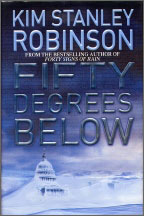 |
 Kim Stanley Robinson
Kim Stanley Robinson
Fifty Degrees Below
Reviewed by: Rick Kleffel © 2005
Spectra / Del Rey / Bantam / Random House
US Hardcover First Edition
ISBN 0-553-80312-3
Publication Date: 10-25-2005
407 Pages; $25.00
Date Reviewed: 12-11-05
Index:
Science Fiction
General Fiction
Non-Fiction
Humans are funny creatures, in all senses of the word. We scrape about on the surface of this planet, hurling one bit of the environment into another willy-nilly, without a care in the world, even though we understand the consequences of what we do. That's strange funny. It's our interpersonal and societal behavior that's comedic funny; covering ourselves with strips of animal hide, the bizarre behaviors we get up to when we like one another or lie to one another. Kim Stanley Robinson's 'Fifty Degrees Below' offers readers a heaping helping of down-to-earth human humor, served up with a side order of science as it is really practiced by said funny humans. Watch us as we wreck everything. Oh, the humanity!
The follow-up to 'Forty Signs of Rain' keeps the focus largely on Frank Vanderwahl, who in the fallout from the finale of that novel has decided to work for the National Science Foundation. Unfortunately for Frank, he's already forsaken his apartment, and the in the chaos resulting from the flood of Washington, DC, he finds himself without a home. But for a man like Frank for whom, "Sociobiology was a bad habit," living in the rough proves to be a good fit. Frank's single step away from the life of a normal Washington bureaucrat takes him closer to nature and perhaps a bit farther from sanity. He's probably the perfect guy to help administer the End Of The World As We Know It.
The second section of Robinson's triptych novel is a marvelous combination of low-key humor and highly literate speculation about the practice of science as opposed to the nature of science. Frank's personal circumstances rapidly reach the ridiculous with a seductively sublime ease. Anyone who has ever paid rent regularly will find his solution to his woes an attractive nuisance. But the reason that rules his working life as a paper-pushing DC drone is jangled by his scientific viewpoint when it comes to his personal life. Robinson does superb job of taking the reader, one step at a time, from a desk-jockey existence to a wild life in the Washington's Rock Creek Park. It's certainly a hoot, but a scary hoot. After all, we are talking about the end of the world.
'Fifty Degrees Below' is a deeply character-driven novel. Robinson goes more than a couple of extra miles to create realistic people reacting in a realistic manner to realistically portrayed events. 'Fifty Degrees Below' bears more resemblance Gustav Flaubert than it does to Isaac Asimov. His people are pitch-perfect believable, and they drive both the action and the speculation in the novel. This turns 'Fifty Degrees below' into a particularly powerful contemplation of both climatic change and the human response to climatic change. Yes, we may know that we're wrecking the world, but one can only do what one can do. One can work with the herd, sure, but the herd moves pretty slowly.
Readers should check any expectations of action-packed super-duper mayhem at the door when they pick up 'Fifty Degrees Below'. Robinson writes thrillingly well of the day-to-day stuff we do. He creates suspense and tension that keep this novel a compelling page-turner by having his characters react realistically to the situations they find themselves in. A homeland security surveillance subplot will chill anyone who doesn't already think they're being watched. Our interesting times are going to have potentially apocalyptic consequences. But the antagonist here is not some capitalistic cabal hoping to control the world. It's the sheer inertia of the human race en masse. Herding cats starts to seem positively simple by comparison. But the joy of life, and of this novel, is Robinson's equally clear vision of how individual humans can make a difference, one damn day at a time.
The lion's share of the novel is devoted to Frank's predicaments, his romantic trysts and interests, his science-shuffling attempts to help those who might create something that will help us all. Charlie and Anne Quibler are still struggling with problems both familiar and unfamiliar. On one hand, Charlie's doing a "Mr. Mom" gig with two kids. But he's also acting as a sort of science policy advisor to a promising presidential candidate. Anna is trying to keep the NSF focused on the "S" -- that is, science -- in a working climate that is becoming increasingly polluted by politics.
Robinson complicates his cast with compelling new characters who include Frank's boss, Diane, and his Buddhist bunk-mate, Rudra. Bunk-mate, you ask? Oh, it's just too delicious to tell. Reading is the gold standard for this series, and Robinson knows how to crank up the soap-operatic elements of his story while packing it with punchy scientific speculation. Yes, the world's going to hell in a handbasket. Robinson turns that handbasket into a spectacular roller-coaster, with ups and downs carved in real human emotions. It's bureaucrats versus the Apocalypse. This is how the world ends. Not with a bang, and not with a whimper -- but a memo.
|
 |
